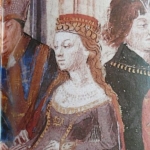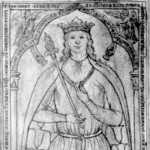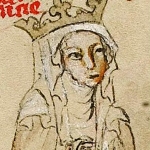Background
Born in Paris on August 21, 1165, Philip became the seventh Capetian king of France in 1180, when his father, Louis VII, died.

Born in Paris on August 21, 1165, Philip became the seventh Capetian king of France in 1180, when his father, Louis VII, died.
There is no exact information on the formal education received by Philip. Though coming from a royal background, it is stated that he was taught under great scholars and also went through military trainings early on. He was not particularly interested in study.
Philip inherited from his father the difficult problem of trying to defend the small royal domain centering on Paris and Orléans against the much more extensive holdings of Henry II of England. By inheritance, marriage, and war, Henry had acquired lands extending from Normandy on the English Channel through Maine, Anjou, and Aquitaine to the Pyrenees. Although young Philip faced seemingly hopeless odds, he exploited the jealousy of Henry's sons, and when Henry invested his favored youngest son, John, with all the King's Continental holdings except Normandy, John's older brother Richard became an ally of Philip and fought his aging father. In 1189 Henry was forced to recognize Richard as heir to all his lands and Philip as his feudal lord for his lands in France. Shortly afterward, Henry II died.
The power struggle had been interrupted by the preparations for the Third Crusade following the fall of Jerusalem in 1187. Now Philip reluctantly joined Frederick I (Frederick Barbarossa) and Richard I, who had become king of England on the death of Henry II. Philip and Richard went to the East together but soon began to quarrel. When the Anglo-French forces recaptured Acre, Philip felt that he had done enough crusading and returned to France to take advantage of Richard's absence in the East.
Richard, unable to capture Jerusalem from Saladin, returned home through Austria but was taken prisoner there and held for ransom. He did not reach the West until May 1194, and in his absence Philip had joined forces with John to recover Normandy. The ensuing warfare between Philip and Richard ended when Richard was killed (1199) in a minor skirmish in central France and John became king of England.
Philip now became John's enemy and used feudal law to dispossess him of his Continental holdings. In 1202 he summoned John to his court to answer a charge made against him, but John refused to come, and Philip therefore declared John's holdings in France forfeit, occupying Normandy and all English lands north of the Loire River. With the occupation of Normandy, the Capetians now had access to the English Channel and deprived John of easy access to his Continental fiefs.
Although preoccupied with defending his kingdom against England, Philip was not unmindful of the opportunities for acquisitions in southern France. In 1207 Pope Innocent III invited Philip to lead a crusade there against the spread of heresy, but Philip declined to take part unless the Pope made John stop fighting in Poitou—something Innocent III could not do. A decade later Philip was still avoiding direct participation in the crusade, but he did permit his son, Louis of France, to lead a French army into Toulouse.
In January 1213, John was excommunicated and deposed for his spoliation of the Church. His troubles with his own English barons encouraged Pope Innocent III to urge Philip to invade England, seize John, and put Louis of France, now married to a niece of John's, on the English throne. But when John turned over England to the Pope and received it back as a papal fief, Innocent ordered Philip to give up the invasion.
John, restored to power with papal protection, then organized an Anglo-Flemish-German coalition to recover his French fiefs. In 1214 Philip met the challenge by sending his son Louis of France as leader of a French army against John, who had led an attack from southwestern France. But John fled rather than fight. Meanwhile, Philip led another French army northeastward from Paris to meet John's ally, Otto IV of Germany, who was about to invade France with an army of English, German, and Flemish knights. Philip crushed this army at Bouvines on July 27, 1214. The students in Paris celebrated the French victory for 7 days and 7 nights.
Bouvines was one of the decisive battles of European history because it led to the ruin of John, upset the balance of power in Europe in favor of France for over a century, and marked the end of the German Empire as the dominant political power in the Christian West. After Bouvines, John returned to England, where he died in 1216. Philip was able to live out his life in peace, certain of Capetian ascendancy.
Philip played an important role in getting good infrastructure and progressing education in his state. He created a central market named Les Halles in the capital of Paris, resumed the construction of Gothic Notre-Dame de Paris Cathedral, created a charter for the University of Paris and built the fortress Louvre. Under the guidance of Philip, Parish came to be known as the city of teachers. He also conducted wine tasting competitions. Philip centralized the administration authority and put up his officials who would visit the regions to collect taxes.
By occupying North of the Loire, the English land, Philip helped add size to his territory and also expand population in his country. By the end of his sovereignty, the size of his region had expanded to the triple of its size and he had his direct control over it. He laid the base to absolute dominion. He increased the number of municipalities and appointed men from middle classes and thus gaining their loyalty.
Philip was a Roman Catholic.
Philip was a great political leader to France.
While Philip was enlarging his kingdom, he was also developing and instituting a plan of civil service whereby men were given high office on the basis of competence rather than hereditary right. To assure obedience in the outlying provinces, where distance encouraged independence, Philip instituted salaried bailiffs responsible for the administrative, military, and judicial supervision of the areas assigned to them.
Philip encouraged the growth of town governments by selling charters and privileges to them, and thus he won the support of town bourgeoisie against the restless nobility. Most of the towns granted new charters were on the frontiers of the royal domain. For Philip they were defensive posts with military obligations. Incomes from this source, from the fees levied on foreign merchants and fairs for protection, and from the profits of justice gave the King the money needed to finance a professional army and government bureaucracy.
As he grew to manhood, he became distrustful, cynical, and crafty, but physically sickly and tense. He had a practical intelligence.
On 28th of April, 1180, Philip was married to Isabelle of Hainaut which brought in Artois, the state in dowry.
In the year 1193, Philip married Ingeborg who was the daughter of King V Valdemar of Denmark. Ingeborg was renamed Isambour after marriage. Due to some reason, Philip was not able to accept Isambour as his Queen wife and when she resisted of his behavior, Philip sent her to a convent and asked Pope Celestine III to annul their marriage. Though Philip claimed that the marriage was not consummated, Isambour contrasted this claim and mentioned herself to be his wife and the Queen of France.
In the meantime, Philip had already found himself a new wife in the daughter of William I, Marguerite of Geneva. But this marriage could not be processed with Marguervite being kidnapped by Thomas I of Savoy on her way to Paris. He married her by force and mentioned that Philip was already married. Philip had his first born son Louis on 5th of September 1187. He inherited the country of Artois after his mother’s death in the year 1190. Philip married Agnes of Merania on 7th of May 1196. They had two children together named Marie and Philippe Hurepel.
Later, Pope Innocent III declared Philip’s marriage to Agnes void mentioning that he was still married to Isambour. Philip was forced to take back Isambour as his Queen in the year 1213.



(5 September 1187 – 8 November 1226)
(15 March 1190 – 18 March 1190)
(15 March 1190 – 18 March 1190)
(1198 – 15 August 1238)
(July 1200 – 14/18 January 1234)
